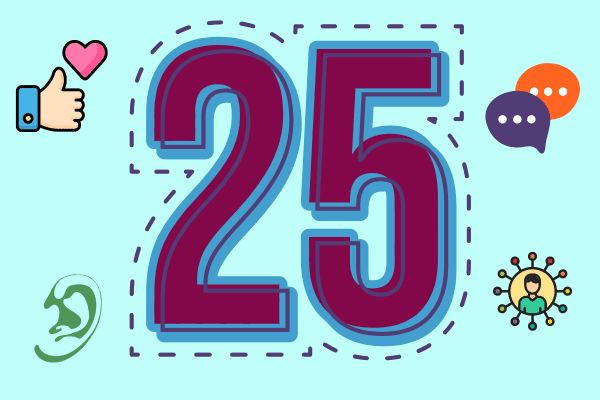Are Self-Development Books Worth It?
There are over 80,000 self-development books on Amazon.
So, maybe the answer is a simple one – Yes. But just because there are so many does not mean they are worthy of our time. There are 500,000 films. Each lovingly created by a Director, wonderfully put together by its Producer and Actors that cared enough to give their all – Mostly. Yet, 99% I would not want to see. ‘Zombie Beavers’ is a fabulous example. The title says it all!
Som is it ‘horses for courses’? Someone liked watching those creatures turn their focus from dam to flesh. Possibly. Allow me to look at this from a learning perspective.
The Time Conundrum
Each self-development book is about 60,000 words. Given an average reading speed of 225 words per minute, a book will take just under 5 hours to read. If we started at 9 am, stopped for an hour for lunch, and a couple of short breaks, we’d finish at 3.30pm. That’s a large chunk of the day.
If you attend a training course for a whole day, your thoughts are, ‘Oh no’, ‘How the hell can I fit this in?!… ‘, and ‘I must have another meeting I should go to instead. I hope so’. Maybe it’s because we don’t read the book in one sitting. And because we use our downtime (for example, commuting on a train), and in short chunks, we don’t consider a day invested. Instead, more that we are improving ourselves during the ‘gaps’ in our life and that must, therefore, be a good thing. Maybe.
My Experiences of Self-Development Books
With our key question in mind – Self-Development Books – Are They Worth Reading? – I wanted to recall and record my own experiences;
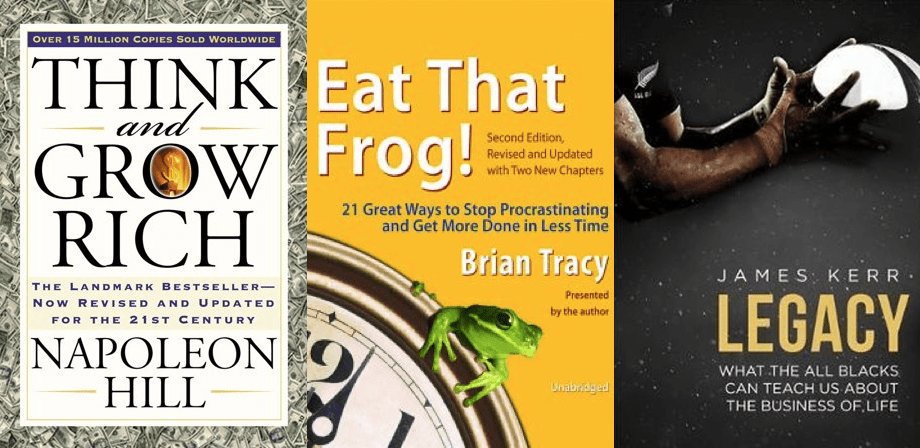
Sticky Learning ® is 7 times more effective than 1-day training courses. Plus, you will get a Chain of Evidence proving your Return on Investment. Discover soft skills training that changes behaviours long term.

‘Think and Grow Rich’ by Napoleon Hill
I read this when I was 19. That was 30 years ago.
I remember a feeling of excitement. To read such a powerful book. One that took over 25 years to write. So, I have an emotional connection to the book. I took away and stored in my long term memory one key nugget. This was that successful people have a burning white light of desire. They had decided what they wanted and focussed on it relentlessly.
Has this learning transferred to any long term behavioural change? Hard to say. If I hadn’t read it, would I act differently? No idea. Was it just a pleasurable book? Possibly.
‘Eat That Frog’ by Brian Tracy
I read this book after leaving the corporate world and about to start my own business. About 17 years ago. I read it because I knew I had to get every productive minute out of my time if I was to be successful.
The nugget I have kept to this day is the metaphor Brian was trying to communicate. He achieved it. The simple metaphor was about getting the worst and biggest task done first. He explains that if you can eat your frog first thing, for the rest of the day, anything is possible.
It changed my behaviour over the long term because I still do it. Maybe it was because the solution solved the problem I had. Perhaps it was because my brain prefers metaphors to processes. Or, maybe it was just the right piece at the right time. But was it worth the amount of time invested? Could I have had that self-development learning and achieved that behavioural change in less time without the book? Probably.
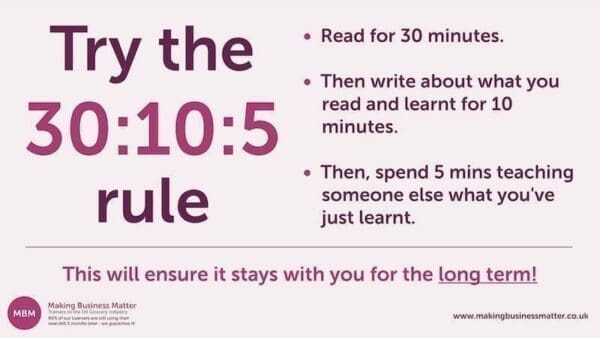
‘Legacy’ by James Kerr
I read this one about 18 months ago. A book all about the All Blacks rugby team and leadership. A great read of 14 lessons on how to be a better leader. The problem is that the only part I remember is the All Blacks team motto – ‘No dickheads’! It stuck with me for its simplicity. Loved it.
The problem is that I haven’t done anything differently since the 5 hours I spent reading it. A day invested to improve me. To be better. To perform better at work and what have I got to show for it – Diddly. Except for an amusing anecdote.
So Where Does All This Self-Development Reflection Leave Us?
The science tells us that most people attend a 1-day training course and do nothing with what they have learnt. Ebbinghaus, a German psychologist, identified this in the mid-1800s. That’s not new news. The focus of this discussion is self-development books because we know that most training is a waste of money. Training courses don’t work, but what about books?
I guess the answer depends on 3 factors;
- Is my objective to solve a self-development problem that I have, or am I reading for pleasure? And yes, you can say both. Well, ish.
- Am I prepared to spend the time reading in order to achieve my objective?
- How likely is this book to achieve my objective?
Most people would probably answer that they are reading for business and pleasure. Ok, fair. And that they have a general type of problem that this book might solve. One of the reasons that the time management section is so popular is that everyone believes they could spend their time more productively because we’re all stressed, have too much to do, and yet still want to do our best. The second two question will never be asked.
Imagine if we did…
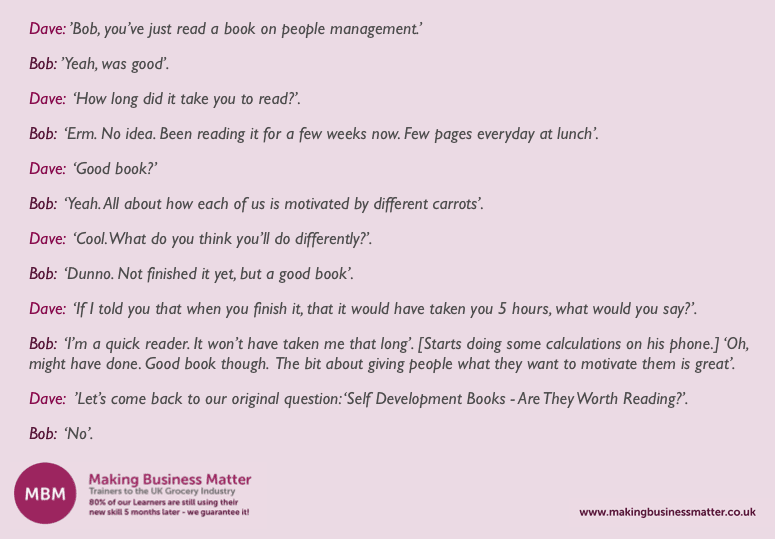
You will take away 1 nugget from a book if you are lucky. And the likelihood of that nugget improving your performance is very little. This writer believes that we read self-development books for 3 reasons;
- In an attempt to be better, though we have never really considered that it won’t help us to be better.
- In part for pleasure. Business books can be enjoyable to read because they are full of stories, and pieces that we think we’ll use, though we are more likely to forget those nuggets in a few weeks.
- To tell others. This is one of the key reasons – ‘Keeping up with the Joneses’. To be seen to be at the cutting edge of the latest trend, to be modern. Or, to be informed and appear to be better.
So, What’s the Key Message?
Accept that you are not reading to improve yourself. This is because the learning sciences suggest that if you want to change behaviour you need to not only put into practice what you have learnt quickly but also do it again and again and again. Remember when you learned to drive? This is called ‘spaced repetition’. I learn I do, I go I and have a think and then do it. Repeat, a lot.
Maybe you are reading for pleasure. Or, you are reading to tell others that you are reading. Perhaps, you are reading for that one nugget that might just be useful. That just might improve your behaviours. Unlikely. You are not reading because you have identified a self-development problem, coupled that with a SMART learning objective, and decided that you are prepared to spend 5-hours reading a book to solve that problem.
Where Does That Leave Us? You’ve Just Cleared 80,0000 Self-Development Books from the Shelves!
I enjoy reading and my bookshelves are full of self-development books. In fact, they’re chockablock. The difference is that I accept that the chances of a self-development book changing my behaviour is slimmer than when Chandler from Friends had his slim phase. I read for pleasure. Also, I read because I like knowledge. And I like to share an anecdote. However, I do not read because it will solve all my business and self-development problems. It won’t. Coaching, training courses, targeted research and applied learning, mentoring, are the only real way that I will change my long term behaviour. And by having an absolute need to change. For example, I wanted to learn how my new iPhone worked. I did. By playing with it until I understood it.

I leave you with this parting thought. Book reviews have a place. Good book. Bad book, etc. For self-development books, we need to extend this to have a ‘How much did this book change your behaviour?’ question added. After all, those books are written to be training aids. To help us to be better. So, did they help us to be better? For each of the books I recalled my rating would be:
Think and Grow Rich
40% behavioural change because that single white light nugget has kept me focused and it was over 30 years ago.
Eat That Frog
80% behavioural change because 17 years on I still, every day, do the rough stuff first.
Legacy
0% because I can only recall one thing and it is very unlikely to help me to be a better CEO.
MBM Book Reviews
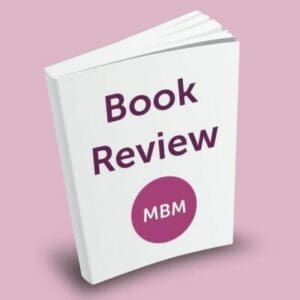
For the book reviews on our blog written by many of you, thank you. From here on in we’ll ask you to rate how much you have engaged in self-development and changed your behaviours as a result of reading the book. This will then help others to decide whether they choose to spend the time reading because they can make an informed choice.
To write a book review, as these guys have done:
Key Person of Influence, by Daniel Priestley, reviewed by Hannah Power.
Please message me or take a look at our write a book review page.



